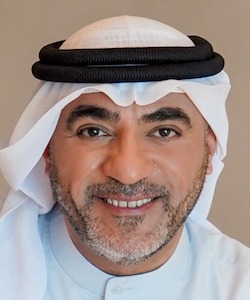
UAE, UAE, DUBAI - Health & Education
Abdul Aziz Al Ghurair
Chairman, Abdulla Al Ghurair Foundation for Education (AGFE)
Bio
Abdul Aziz Al Ghurair is the Chairman of Mashreq Bank and a member of the board of directors of the 50-year-old Abdulla Al Ghurair Group, which has operations spanning more than 20 countries. He serves as Chairman of AGFE, one of the region’s largest private institutional philanthropic initiatives, which works to improve access to education, as well as college and career readiness for Arab youth. In 2018, he announced the Abdul Aziz Al Ghurair Refugee Education Fund, a USD27-million initiative to benefit young refugees. The fund is a philanthropic gift from Al Ghurair administered by AGFE.
What can we do to enhance education offered here and worldwide?
Firstly, working on education is endless and rewarding. There is much we can do to enhance education, especially as new technologies disrupt our way of life and traditional ideas of education. Education will have to go through a disruption, and a new model of teaching is needed, particularly in the way we deliver education. I am a strong believer in online teaching, not only at the university level, but also at lower levels. Gone are the days when you had to feed students with information. We must provide them with the medium, and they should be able to extract information while we guide them where to go for information. We may reduce our classroom hours and allow more free time for our students to become explorers, rather than being in a classroom passively absorbing information. This will also bring the cost of teaching down; we will no longer need huge classes to deliver those lessons. Universities will have to offer some classes, courses, and degrees online. There is a resistance from traditional professors and universities that believe you have to have a physical campus and eye contact with your professors. There is a role for traditional education delivery, but not 100%. I want to see at least 10% of outside-the-classroom study. Today, there is so much material available outside the classroom. It is about bringing live, practical cases from the real world to students and giving them opportunities to learn individually. As for Dubai leading the region, we have started great initiatives, from Dubai Care to the Maktoum Charity Foundation. It would be nice if all philanthropists on the private side could also get together and share their opinions and experience.
You are one of the first to promote the private sector’s involvement in refugee education. What is your message to the private sector, and how is your fund looking to collaborate further with the private sector?
I went public with the Abdul Aziz Al Ghurair Refugee Education Fund to showcase there are good, genuine people doing philanthropic activities and willing to talk about them. Typically, people do not like to talk about this. Not only do we talk about it, but we also have KPIs. We have AED100 million (USD27.2 million) to be spent in three years, so we need to measure our performance and our impact. The fund is administered by the AGFE; this is another way in which we differ from most traditional charities and philanthropic entities who are not completely transparent. These organizations need to be professionally run by a full, dedicated team. AGFE, with its 18 team members, does not deliver any of the services; we use our partners to do this. For example, for our refugee camps we put the criteria in place and select and monitor the partners. We do not deliver services because there are better people who can deliver education to refugees better than we could. We do not want to be a high school or a university. My message to our business community here is that they should come out and set up more professionalized charity work and work for impact. They should set up their KPIs, talk about their progress, and encourage other people. This also serves to encourage people not to duplicate work as well facilitate knowledge transfer. While I do not want people to duplicate our activities, they can learn from us and apply it to their own initiatives. We can save them all that hard work and research we have done over the last three years about how to bring education to refugees in a cost-effective and innovative way with an impact on the ground.
ADVERTISEMENT
ADVERTISEMENT
You may also be interested in...

UAE - Telecoms & IT
Hussain Al Mahmoudi
Interview
CEO, Sharjah Research Technology and Innovation Park (SRTIP), UAE



